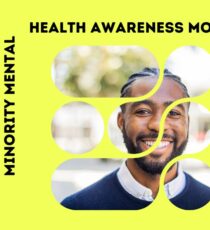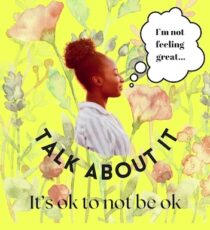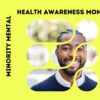
May is Mental Health Awareness month, and according to the National Alliance on Mental Illness (NAMI), African Americans are 20% more likely to experience serious mental health issues.
Depression and anxiety are common medical disorders in our community. And whether these disorders are situational or biological, there are ways to cope. Below are a few suggestions to help manage and protect your mental health.
Talk to Someone You Trust
Talking with a trusted and non-judgemental friend can be really helpful if you’re experiencing depression and/or anxiety. A friend doesn’t take the place of a therapist, but talking things out can help you release your difficult feelings and process. Also, the care of a good friend who listens and either offers sound responses or a comforting ear can make you feel loved and supported. That helps when you may be feeling isolated with your depression or anxiety.
Exercise
Exercising is a great way to manage depression and anxiety. Endorphins and other “feel good” chemicals are released in the brain, making you feel better. It’s physical and engaging so it helps you redirect your thoughts to focus on the activity and not how badly you feel. Exercise is also a catch 22 because when you’re depressed, you have low energy and don’t want to do anything. So it’s a struggle to get to the gym, or even go outside.
If you feel too depressed to get active, try telling yourself you’re going to move for just 10 minutes, whether it’s a brief walk, or a little dancing in your room. Once you get started you’ll probably want to do more.
Turtle
If part of your depression is triggered by your environment, like work, try to “turtle”. When you turtle, you implement protective behaviors to minimize exposure to what causes your emotions to decline. That can mean you put your earphones in to block out noise, annoying conversation or signal to others that you need to be left alone. Another way to turtle is to put distance between yourself and the trigger. If you can, work from home. If you can’t, see if you can take a laptop to a conference room or a quiet corner in the office where you can get some work done without being subjected to the immediate surroundings that put you in a bad place. Whatever the environment is that causes distress, do what you can to distance yourself from it.
Meditate
Taking a mental break to focus on your breathing to clear your mind and connect with yourself is an effective way to manage depression and anxiety. Over time, a regular practice can help your mind slow down so you can relax and gain clarity and control over emotions that may be overwhelming.
Be Social
It’s natural to want to isolate yourself when you’re depressed or anxious, but reaching out to your loving social circle to do something fun can be helpful. Be honest with people in your life about your mental health so they understand that you may not be your complete self when hanging out and can support you. Also, a more active social life can help keep your mood elevated to avoid emotional lows.
And, if people in your life can’t understand your mental health challenges, are dismissive or aren’t supportive, keep your distance. You need positive, loving reinforcement during this time. No negativity allowed.
Don’t Believe the Hype
Remember that your thoughts are just thoughts. When you’re depressed or anxious, your minds play tricks on you, convincing you of things like: you’re not good enough, not worthy of good things or that your circumstances will always be the same. Don’t fall for it. Try to remember that when depressed your mind tends to focus more on negative thoughts, and those thoughts are not facts.
Get Help
Effective therapy can give you the tools you need to manage your anxiety and depression so the weight isn’t so heavy. A good therapist can help you identify what causes the anxiety and depression and assist you with a plan to navigate your illness. There’s no shame in seeking professional help, and/or taking medication to manage your mental health. There is only the potential to develop a better understand of yourself, your illness, how it works and how to feel more in control.
Remember, you deserve to be happy and well. Please do whatever it takes to ensure your peace and happiness.






Social Menu